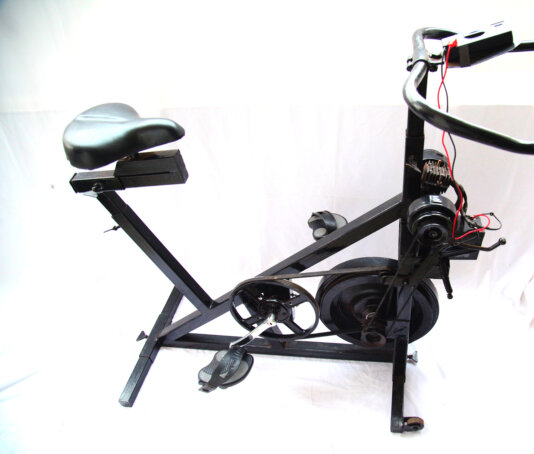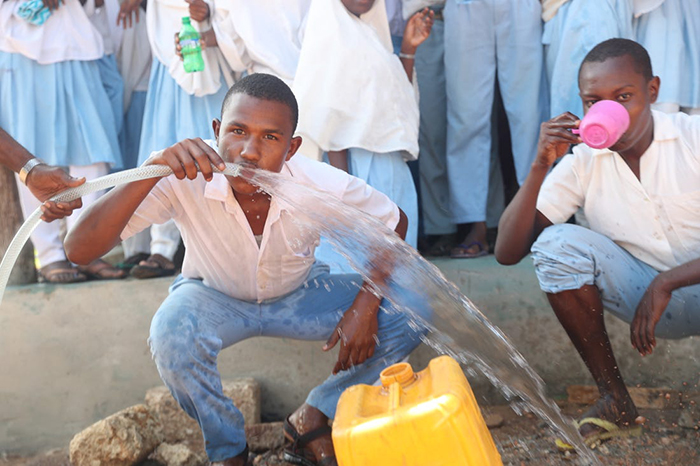- About
- Topics
- Picks
- Audio
- Story
- In-Depth
- Opinion
- News
- Donate
- Signup for our newsletterOur Editors' Best Picks.Send
Read, Debate: Engage.
| September 27, 2021 | |
|---|---|
| topic: | Renewables |
| tags: | #energy, #clean energy, #innovation, #Africa |
| located: | Cameroon |
| by: | Bob Koigi |
An estimated 759 million people globally today have no access to electricity.
In Sub Saharan Africa, over 600 million, more than half of the continent’s population, are not connected to the national grid and rely on harmful sources of energy for their daily use.
Those who are able to access electricity grapple with huge power bills and frequent outages.
At the same time, non-communicable diseases including cancer, hypertension and diabetes, which are associated with unhealthy lifestyles, continue to take a toll on African countries and economies.
Data shows that 77 percent of all non-communicable diseases deaths are in low- and middle-income countries.
One Cameroonian entrepreneur is seeking to power Africa using clean sources of energy, while encouraging people to fight non-communicable diseases by remaining fit through his invention.
Dubbed Bonga Power Bike, the stationary bike allows users to pedal to produce energy that is then used for basic needs, including lighting homes, charging mobile phones and powering television and radio, while giving users an opportunity to exercise and keep fit.
Bongajum Lesley Ndzi, the brains behind the invention, spoke to FairPlanet about his journey, the highs and lows and the dream to light up Africa.
FairPlanet: Tell us a bit about the Bonga Power Bike and what inspired you to come up with the invention.
Bongajum Lesley Ndzi: My invention was inspired largely by my childhood and struggles as an entrepreneur.
When I was growing up in Cameroon, we struggled with incessant power outages that interfered with my education. When there were blackouts we used candles and tin lamps to read, which affected my eyes and lungs.
When I grew up and became an entrepreneur running a juice distribution business, my business was affected by frequent power cuts that would make the juices go bad.
I am also an avid fitness enthusiast and work out to stay healthy. So one day when in one of my workout sessions using the gym bike I started wondering how I could channel all the energy that went into pedaling that bike into something useful. After doing my research I thought of coming up with something akin to a gym bike that could generate electricity, which would in turn benefit the people.
From discarded car, motorcycle and bicycle parts I came up with a prototype that I named Bonga Power Bike.
How exactly does the invention work and what makes Bonga Power Bike unique?
Bonga Power Bike transforms the mechanical energy generated when one is pedaling into electrical energy that is stored in a battery. This energy can be used for various domestic uses, including lighting homes, charging phones and powering energy -saving televisions, among others.
When a user starts pedaling the stationary bike they exert human energy on the flywheel. The flywheel [then] turns on an electric motor that has coils. As the coils turn, they produce electricity via electromagnetism.
Pedaling the bike for 30 minutes is enough to produce electricity that can light seven light bulbs for 12 hours, turn on a fan, power a TV and charge phones. The beauty of it is that one is able to keep fit as they produce power.
As a young innovator working on creating homemade solutions to local problems, do you feel your government, and other governments across Africa, are doing enough to motivate innovators? What more should be done?
I feel that the government hasn’t done enough, because, for starters, there are very few successful projects that governments have invested in to motivate young innovators.
The government should focus on young people who have shown these unique skills and talents. We are in a digital era and without the right support for our young, people will lose out on a lot of opportunities and exposure.
Nowadays, technologies like mobile phones and laptops are easily accessible in Africa, especially among young people who are using them to educate themselves and do business. This is where the government should tap into. An innovation revolution is brewing in Africa, driven by the young generation and one that can be a game changer for the continent. The government needs to appreciate this and dedicate its resources into harnessing this phenomenon.
What would you say has been the highlight of your invention?
The reception of my innovation by the community is what I would consider one of the greatest achievements. When I was starting out, I considered it a small project, but when we went to the field to test the prototype the enthusiasm from the community members was very evident. That was a validation that we were on the right track in addressing a need, and the people we were targeting were ready to embrace this innovation.
That reception has inspired us to put more energy and focus into making this invention transformative to people’s everyday lives.
What has been the toughest challenge in this journey?
As we try to roll out the invention to as many people as possible, especially in the rural areas, we have been struggling with access to finance. But we are exploring various options and partnerships to see how we can address this.
How has COVID-19 affected your business and the people you serve?
When we developed the first prototype of the bike, we received a lot of interest, especially from the rural areas where we were piloting the concept. I had even patented the idea and we were ready for a mass rollout. When COVID-19 struck, we had to put everything on hold. It has affected our implementation plans, but we are keen on reviving the project, especially because the demand and interest continue to grow.
How are innovations like Bonga Power Bike addressing energy poverty in Africa and deepening sustainable, clean energy access?
For Bonga Power Bike, our main focus is to ensure that we put the power of electricity generation at the hands of ordinary people, while ensuring we have a non-communicable disease free Africa.
As Africa grapples with energy poverty, even with the abundance of natural resources and clean energy sources like solar and wind, the missing link is tapping into its young innovators who have exhibited their prowess in finding homegrown solutions to African problems.
Inventions like Bonga Power Bike are the panacea that places ownership of solutions at the hands of local communities.
You have received awards and recognitions for your invention. What does that mean to you and your work?
Entrepreneurship is a very tough calling. You put in a lot of effort, time and energy, and you don’t get anything at the initial stages. Having these awards and recognitions, especially when they come from experts, is an endorsement and a motivation to keep putting the best foot forward when sometimes you feel like giving up.
I would, however, like to note that these awards and recognitions have largely been driven by the private sector and development agencies. If the African governments and the African Union can step in to organise events that recognise innovators, they would go a long way in incentivising millions of young people who have such remarkable innovations that remain untapped.
There is also a need for various players, private and public, to work with experts in order to assist young innovators in harnessing their ideas and bringing them to life.
What is the ultimate plan for Bonga Power Bike moving forward?
We have received a lot of interest to roll out the invention in different African countries. Our mission is to produce the invention on a large scale so that we can light up rural Africa.
We intend to expand to these countries and work to improve our business model. We are convinced that this innovation will attract a lot of people, especially in Sub Saharan Africa, who are keen to tap into clean sources of energy.
Image by: Sunbeam Photography
By copying the embed code below, you agree to adhere to our republishing guidelines.

